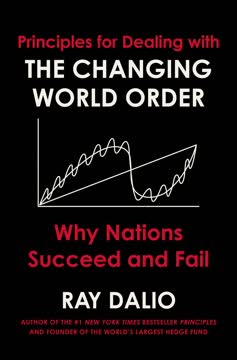つの重要なポイント
1. 現実を受け入れ、徹底的な真実と透明性を通じて対処する
真実、またはより正確には現実の正確な理解は、良い結果を得るための基本的な土台である。
徹底的な真実と透明性は成功のための基本原則である。これには、現在の現実、特にミスや弱点について正直であること、そして情報をオープンに共有することが含まれる。このアプローチは、より良い意思決定、迅速な学習、そして強固な関係をもたらす。
現実を受け入れることの利点:
- 問題解決の迅速化
- 信頼と協力の向上
- 個人および組織の成長の加速
現実に直面することで、個人や組織は以下のことができる:
- 問題をより効果的に特定し対処する
- より情報に基づいた意思決定を行う
- 継続的な改善の文化を築く
2. 目標達成と問題解決のための5ステッププロセスを活用する
目標は通常、次のステップで達成される: 1) 明確な目標を持つ、2) 問題を特定し容認しない、3) 問題の根本原因を診断する、4) それを回避するための計画を設計する、5) これらの計画を結果に結びつけるために必要なことを行う。
5ステッププロセスは、目標達成と問題解決のための強力なフレームワークである。これは、ビジョンを現実に変えるための構造化されたアプローチを提供する。
5ステッププロセスの内訳:
- 明確な目標を設定する: 達成したいことを定義する
- 問題を特定する: 目標達成を妨げる障害を認識する
- 根本原因を診断する: 問題の根本的な理由を理解する
- 解決策を設計する: 障害を克服するための計画を作成する
- 実行しフォローする: 解決策を実施し、目標が達成されるまで粘り強く取り組む
このプロセスは、個人的な目標、ビジネスの課題、または複雑な問題に適用できる。各ステップを体系的に進めることで、個人や組織は成功の可能性を高め、パフォーマンスを継続的に向上させることができる。
3. 徹底的な開放的思考を実践し、エゴと盲点を克服する
徹底的な開放的思考は、自分の選択が最適でないかもしれないという真剣な懸念から動機づけられる。
徹底的な開放的思考は、自分が間違っているかもしれないと考え、自分の見解に挑戦する視点を積極的に求める意欲である。このアプローチは、認知バイアスやエゴに基づく意思決定を克服するのに役立つ。
徹底的な開放的思考の重要な側面:
- 多様な視点を積極的に求める
- 思慮深い異議を受け入れる
- 自分のバイアスを認識し挑戦する
徹底的な開放的思考を実践する利点:
- 意思決定の改善
- 学習と個人の成長の強化
- 強固な関係と協力の向上
徹底的な開放的思考を育むために、他者からのフィードバックを定期的に求め、建設的な批判を奨励し、挑戦的なアイデアが歓迎され報われる環境を作り出す。
4. 人々は異なる配線を持っており、その独自の強みを活用する
私たちは皆、違いから生じる強みと弱みを持っている。
認知の多様性を認識することは、効果的なチームや組織を構築するために重要である。人々は異なる思考方法や情報処理方法を持っており、これを活用することで意思決定や問題解決を改善できる。
一般的な思考スタイルの違い:
- 大局観 vs. 細部志向
- 創造的 vs. 分析的
- 内向的 vs. 外向的
- 計画的 vs. 自発的
認知の多様性を活用するために:
- 個々の強みと弱みを評価する
- 自然な能力に合った役割を割り当てる
- 補完的なスキルを持つ多様なチームを作る
- 協力と知識共有を奨励する
これらの違いを理解し受け入れることで、組織はより革新的な解決策を生み出し、より良い意思決定を行い、強力なチームを構築することができる。
5. 信頼できる人々と三角測量して効果的に意思決定する
あなたと意見が異なる最も信頼できる人々を見つけ、彼らの理由を理解しようとする。
三角測量は、特に信頼できる情報源から複数の視点を求めることで、より良い意思決定を行うプロセスである。このアプローチは、個々のバイアスや盲点を克服するのに役立つ。
効果的な三角測量のステップ:
- 関連する専門知識を持つ信頼できる人々を特定する
- 特に自分の意見に挑戦する多様な視点を求める
- 異なる視点を分析し比較する
- 情報を統合して、よく考えられた意思決定を行う
三角測量の利点:
- 意思決定エラーの減少
- 意思決定に対する自信の向上
- 複雑な問題の学習と理解の向上
三角測量を一貫して実践することで、個人や組織はより堅実な意思決定を行い、意思決定プロセスを継続的に改善することができる。
6. 組織内で意義のある仕事と関係を育む
意義のある関係と意義のある仕事は、徹底的な真実と徹底的な透明性によって特に強化される。
意義のある仕事と関係の文化を作ることは、長期的な組織の成功に不可欠である。これには、個人と組織の目標を一致させ、オープンなコミュニケーションを促進し、チームメンバー間の信頼を築くことが含まれる。
意義のある仕事と関係の重要な要素:
- 共有された目的と価値観
- オープンで正直なコミュニケーション
- 相互尊重と信頼
- 成長と発展の機会
意義のある仕事と関係を育むための戦略:
- 組織の使命と価値観を明確に伝える
- 定期的なフィードバックとオープンな対話を奨励する
- 協力とチームビルディングの機会を提供する
- 組織の目標への貢献を認識し報いる
意義のある仕事と関係の環境を育むことで、組織は従業員のエンゲージメント、定着率、全体的なパフォーマンスを向上させることができる。
7. 優れたチームを構築するために、常に訓練、テスト、評価、選別を行う
最も重要な決定は、責任者として誰を選ぶかであることを認識する。
優れたチームを構築するには、才能を開発し、パフォーマンスを評価し、適切な人材が適切な役割に配置されていることを確認するための継続的な努力が必要である。このプロセスは、組織の卓越性を維持するために重要である。
効果的な人材管理の主要な要素:
- 厳格な採用プロセス
- 継続的な訓練と開発
- 定期的なパフォーマンス評価
- 厳しい人事決定を行う意欲
優れたチームを構築し維持するためのステップ:
- 明確な役割と責任を定義する
- 継続的な訓練とフィードバックを提供する
- 目標に対するパフォーマンスを定期的に評価する
- 昇進、再配置、または解雇に関するデータに基づいた決定を行う
チームの開発と最適化に一貫して焦点を当てることで、組織は野心的な目標を達成できる高性能な労働力を構築することができる。
8. 目標を達成するために自分の機械(組織)を設計する
問題を機械が生み出す結果のセットとして考える。
組織を機械として見ることで、望ましい結果を達成するためのプロセスを設計し最適化するのに役立つ。この視点は、体系的な改善と問題解決を可能にする。
組織設計の主要な要素:
- 明確な目標と指標
- 明確に定義されたプロセスとワークフロー
- 適切なリソースの配分
- 継続的な改善のためのフィードバックメカニズム
効果的な組織機械を設計するためのステップ:
- 望ましい結果と主要なパフォーマンス指標を定義する
- プロセスをマッピングし、潜在的なボトルネックを特定する
- 個々の強みに基づいて役割と責任を割り当てる
- パフォーマンスを監視し改善するためのシステムを実装する
組織を機械として考えることで、リーダーは効率の悪さをより効果的に特定し対処し、全体的なパフォーマンスを向上させることができる。
9. 問題を認識し、その根本原因を診断し、解決策を設計する
目新しいものに気を取られないようにする。
問題解決は、組織の成功にとって重要なスキルである。これは、問題を特定し、その根本原因を理解し、効果的な解決策を開発することを含む。
効果的な問題解決のステップ:
- 問題を認識する: 問題や非効率を積極的に探す
- 根本原因を診断する: 問題に寄与する根本的な要因を分析する
- 解決策を設計する: 根本原因に対処する包括的な計画を立てる
- 実行し監視する: 解決策を実施し、その効果を追跡する
問題解決の主要な原則:
- 最も重要な問題に焦点を当てる
- パターンやシステム的な問題を探す
- 課題についてオープンなコミュニケーションを奨励する
- 成功と失敗の両方から学ぶ
問題とその根本原因に体系的に対処することで、組織は継続的に改善し、変化する状況に適応することができる。
10. 目標を達成するために機械を操作するように管理する
従業員の個人的な進化におけるあなたの役割は、彼らの強みと弱みを率直に評価し、訓練を通じて弱みを軽減するか、または彼らの強みと好みに合った別の仕事に移る計画を立てることから始まる。
効果的な管理は、組織の機械を監督し、すべてのコンポーネントが望ましい結果を達成するために連携して機能することを確保することを含む。これは、人々、プロセス、問題解決に対する体系的なアプローチを必要とする。
機械のオペレーターのように管理するための主要な側面:
- 明確な目標と指標を設定する
- パフォーマンスを監視し、問題を特定する
- データに基づいた意思決定を行う
- プロセスと人々を継続的に最適化する
効果的な管理のための戦略:
- 主要なパフォーマンス指標を追跡するための包括的なダッシュボードを開発する
- 進捗を評価し、問題を特定するための定期的なレビューを実施する
- 継続的な改善と学習の文化を育む
- 個人およびチームの目標を全体の組織目標と一致させる
このアプローチを採用することで、マネージャーは組織をより効果的に成功に導き、情報に基づいた意思決定を行い、変化する状況に適応することができる。
最終更新日:
FAQ
What's Principles by Ray Dalio about?
- Personal and Professional Insights: Principles combines Ray Dalio's personal journey with the principles he developed throughout his career as a successful investor and entrepreneur.
- Life and Work Principles: The book is divided into three parts: Where I’m Coming From, Life Principles, and Work Principles, each outlining fundamental truths guiding Dalio's decision-making.
- Focus on Learning: Dalio emphasizes learning from mistakes and experiences, advocating for a systematic approach to decision-making based on repeatable principles.
Why should I read Principles by Ray Dalio?
- Valuable Life Lessons: The book offers insights into navigating life's challenges and making better decisions, sharing lessons from Dalio's successes and failures.
- Framework for Success: Readers gain a framework for understanding reality and making effective choices applicable in various life aspects.
- Unique Perspective: Dalio combines personal anecdotes with practical advice, making it relatable and actionable for readers from all backgrounds.
What are the key takeaways of Principles by Ray Dalio?
- Embrace Reality: Accept the truth of situations, no matter how uncomfortable, and use that understanding to inform decisions.
- Radical Open-Mindedness: Be open-minded and transparent in relationships, fostering an environment for honest feedback and constructive criticism.
- Systematic Decision-Making: Use documented principles to guide actions, helping individuals and organizations learn from past experiences and improve over time.
What is the 5-Step Process in Principles by Ray Dalio?
- Define Your Goals: Clearly identify what you want to achieve, setting the foundation for the entire process.
- Identify Problems: Recognize obstacles hindering your goals, requiring an honest assessment of the current situation.
- Diagnose Problems: Analyze the root causes of identified problems to develop effective solutions.
- Design Solutions: Create actionable plans to address diagnosed problems, requiring creativity and experimentation.
- Implement and Evaluate: Put solutions into action and continuously evaluate their effectiveness, allowing for adjustments and improvements.
How does Ray Dalio define "believability" in Principles?
- Credibility Based on Experience: Believability is the degree to which a person's opinions can be trusted based on past successes and relevant experience.
- Weighting Opinions: Opinions should be weighted according to the believability of the individuals providing them, giving more credible voices greater influence.
- Continuous Learning: Believability can change over time as individuals gain more experience and knowledge, encouraging a culture of learning.
What is the concept of "radical transparency" in Principles by Ray Dalio?
- Open Communication: Share information openly within an organization, allowing everyone to see decision-making processes and outcomes.
- Encouraging Feedback: Radical transparency encourages honest feedback without fear of repercussions, leading to continuous improvement.
- Building a Stronger Culture: It is essential for creating a strong organizational culture, aligning everyone towards common goals with the best available information.
How does Ray Dalio suggest handling mistakes in Principles?
- Embrace Mistakes: View mistakes as opportunities for learning rather than failures, encouraging reflection on errors for valuable lessons.
- Document and Analyze: Keep a record of mistakes and analyze their root causes to prevent similar errors in the future.
- Encourage Open Discussion: Create an environment where mistakes can be openly discussed without fear of punishment, allowing teams to learn collectively.
What role does meditation play in Ray Dalio's life and work according to Principles?
- Mental Clarity: Meditation provides mental clarity and emotional stability, helping Dalio approach challenges with a calm and open mind.
- Enhanced Creativity: It fosters creativity by allowing the mind to relax and explore new ideas, contributing to independent thinking and innovation.
- Stress Management: Regular meditation helps manage stress effectively, enabling focus and productivity in high-stakes environments.
How does Ray Dalio view the relationship between success and failure in Principles?
- Learning from Failure: Failure is an integral part of the journey to success, with the most successful individuals learning from their failures.
- Resilience and Adaptation: The ability to bounce back from setbacks and adapt to changing circumstances is crucial for long-term success.
- Continuous Improvement: Success is a continuous process of striving for improvement, with principles designed to help individuals and organizations evolve.
What is the concept of an idea meritocracy in Principles by Ray Dalio?
- Definition: An idea meritocracy prioritizes the best ideas based on their merit rather than the authority of the person presenting them.
- Implementation: Tools like the Dot Collector facilitate real-time feedback and decision-making based on believability.
- Benefits: It fosters a culture of trust and accountability, leading to better decision-making and improved outcomes.
How does Ray Dalio suggest handling disagreements in Principles?
- Constructive Disagreement: View disagreements as opportunities for learning rather than conflicts, engaging in thoughtful discussions for better understanding.
- Two-Way Responsibility: Both parties in a disagreement should express their views and listen actively, ensuring all perspectives are considered.
- Emotional Control: Defer discussions if emotions run high, as logical reasoning is often compromised, allowing for clearer thinking later.
What are some best quotes from Principles by Ray Dalio and what do they mean?
- "Pain + Reflection = Progress": Experiencing pain and reflecting on it leads to personal growth and improvement, emphasizing learning from challenges.
- "Embrace Reality and Deal with It": Confront harsh truths rather than avoid them, as acknowledging reality is essential for informed decisions.
- "The best ideas win": Highlights the importance of an idea meritocracy, where credible and effective ideas are prioritized over biases or hierarchies.
レビュー
レイ・ダリオの『Principles』は賛否両論を受けている。多くの人々は、意思決定、マネジメント、個人の成長に関する洞察を称賛し、ダリオの成功のための原則に価値を見出している。一方で、批評家たちはこの本が繰り返しが多く、冗長であり、自己賛美的であると主張している。ダリオの正直さと独自の視点を評価する人もいれば、彼のアイデアが非現実的または非人間的だと感じる人もいる。自伝的な部分についても意見が分かれている。全体として、読者はこの本が思考を刺激する概念を提供していると認めているが、その全体的な質と適用性についての意見は分かれている。
Similar Books


















